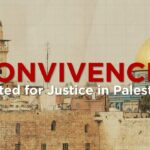Convivencia
United For Justice
The Convivencia Alliance
Conveners: Prof. Haim Bresheeth, Mr. Massoud Shadjareh & Revd. Dr. Stephen Sizer.
Towards a Just Coexistence in Palestine/Israel and Elsewhere – Common History Inspiring Collective Action
Preamble
The views expressed here are of the Convivencia Alliance in the UK. Our constituencies rightly expect a clear description of our commitment to a just peace in Palestine and we have shaped this document together with leading organisations and activists in Palestine. We fully accept that the future of Palestine will and should be decided there through the process of decolonisation and the ending of Zionist control and its privileges and will be shaped by the political forces on the ground.
Recently, Israel has initiated the ‘Abraham Accords’ with some of the Gulf states. This is part of the normalisation agenda fomented by Israel and the US, designed to separate the Palestinians from the rest of the Arab world. It is a dangerous development, aiming to freeze the situation in Palestine, denying Palestinians rights and allowing more and more of Palestine to be actively illegally confiscated and colonised by settlers. In no way is the Convivencia Initiative supporting this toxic move towards denying justice for Palestinians.
The idea of modern Convivencia
Convivencia is a cross-faith, international initiative for a just peace in the Middle East. This is a better way forward than the current militarised ‘solutions’ based on racist oppression, brute force, denial of rights and colonial dispossession. The proposal is based on a history of shared values of the monotheistic faiths. It is also based on the Universal Declaration of Human Rights, especially its placing of responsibility on everyone ‘to promote respect for these rights and freedoms’[1]. The call extends to people of all faiths and none who are committed to these values. Instead of dividing people, this approach unites them in a search for a just peace based on equality for all in Palestine/Israel. The intention follows the original PLO programme, towards building a shared political community[2] through a process of decolonisation, beginning with Palestine. This requires an end to Zionism, apartheid and occupation, and building a just and democratic civic society in the whole of Palestine.
At different times and places, all faiths have been afflicted by various aspects of racist behaviour. Racism and Supremacist positions should be totally and clearly rejected by all religious and civic communities. All forms of racism must be treated in the same manner, being equally reprehensible. Two important historical examples of people of different faiths living in mutual respect were Andalucia during the Golden Age and Palestine throughout most of its history, with the exception of the time of the Crusades. The Ottoman Empire was, like other empires of the period, based on multifaith and multinational coexistence. We wish to use such concrete examples as models for future coexistence in Palestine and beyond, especially in the Middle East.
Unfortunately, racist agendas have been treated differentially in Britain. Allegations of antisemitism have been weaponised by conflating it with anti-Zionism to suppress popular campaigns for a just peace in Palestine/Israel. Thus, Israeli settler-colonial privileges as well as Israeli actions against Palestinians, combine to deny Palestinians universal human rights and constitutes the international crime of Apartheid.
‘Inter-faith’ dialogue today is driven by a Zionist agenda, silencing any discussion of Palestinian rights. This ‘coexistence’ is dishonest and undermines the core values of the three faiths. In addition, Israeli–Palestinian normalisation projects, sponsored by Western governments, legitimise Apartheid. All these practices collude with racism and must be opposed through a genuine anti-racist agenda, namely: a just co-existence based on decolonisation.
The concept of justice is central to all three monotheistic faiths. It follows that any political system that gains their support must combine equality, justice and universal human rights in order to deliver peace, democracy and the rule of law. In this way, the process of decolonisation will create the shared political community crucial for a real Convivencia. Of course, at various historical junctures practitioners of the three faiths have denied or contradicted such principles. Despite these aberrations, they are the basis for modern democratic systems supported, of course, by other faiths and humanists who honour the same principles.
After the Nazi Holocaust a new global commitment was enmeshed in the 1948 Universal Declaration of Human Rights, which puts this clearly: “In the exercise of his rights and freedoms, everyone shall be subject only to such limitations as are determined by law solely for the purpose of securing due recognition and respect for the rights and freedoms of others and of meeting the just requirements of morality, public order and the general welfare in a democratic society.”[3] Guaranteeing human rights and justice is the duty of all governments, but their accountability depends on citizens’ collective action. In 1970, the crime of Apartheid – the legalised form of racism – was defined by the UN, and made illegal, being incompatible with the Universal Human Rights UN declaration. With that in mind, we recognise that the end of Apartheid in South Africa failed to bring about a just society, or the shared political and economic community of Whites and Blacks; this resulted from using capitalist market forces and the Shock Doctrine[4] to shape the new South Africa, preserving class privileges and inequality.
In contrast to South Africa, we believe that the decolonisation of Palestine should include redistributive justice. Effective action to live up to these principles needs to find common sources and inspirations for action towards a fully multicultural anti-racist programme. This must oppose all state racisms including the violent imposition of political Zionism, based as it is on racist colonial notions. The Zionist movement cited endemic antisemitism as necessitating a Jewish state but did not organize or join opposition to antisemitism. Indeed, it reproduced Christian antisemitic stereotypes of Eastern European Jews, who had to be uplifted by imitating European colonialism in Palestine.[5] From its inception, political Zionism was an exclusivist Jewish settler-colonial project, intending to expel the Palestinian indigenous population. Demands for justice in Palestine provide a link between long-standing concepts of the three monotheistic faiths and today’s many efforts towards a just coexistence (living together justly).
From Convivencia (coexistence) to racist state persecution: A historical regression
In southern Spain, now called Andalucía, people of the three monotheistic faiths (Muslims, Jews and Christians) lived in relative harmony during Moorish Muslim rule for a few hundred years, until the Christian Reconquista expelled the Jews and Muslims from 1492. That period has been retrospectively described as the Convivencia, Spanish for coexistence or living together. This concept is used today for the co-existence of various faiths and immigrant groups. In particular, ‘Days of Integration and Convivencia’ have been regularly held in Spain.[6]
For most of the Moorish period, Al Andalus (its Arabic name) enjoyed a great flowering of the arts and sciences, as well as of philosophy, literature and poetry. The Caliphate encouraged a culture enriched by the three religious communities.[7] It understood that the three religions shared some crucial principles. The two younger faiths accepted their historical debt to Judaism.
Some benefits of this shared past are still evident today. Beyond the obvious artistic flowering which turned the cities of Al Andalus into centres of intellectual creativity without equal, including the preservation and rediscovery of classical texts lost to Europe due to Rome’s, and even Byzantium’s, persecution of much pre-Christian cultural heritage. The classical Greek literature and drama, which had been suppressed by centuries of Christian animosity, survived in the original version or in translations into Arabic. They were now retranslated into Latin and the various ‘vulgar tongues’ – the local European languages.
In those ways, Moorish rulers provided an intellectual haven which preserved and extended classical knowledge, in turn serving as a basis for the Renaissance and, later, the Age of Reason or Enlightenment. The advances in Al Andalus were stimulated by a scientific explosion (of mathematics, algebra, geography, astronomy, physics and chemistry) fuelled by the knowledge that had been preserved and further developed in Damascus, Baghdad, Cairo and north Africa’s Muslim centres of learning.
After 1492 Muslims and Jews were expelled from Al Andalus or were forced to convert. Andalucian scientific advances were later used by Europe’s great navigators to establish a nautical-cartographic foundation for discovering new routes to the East and the ‘New World’; eventually dominating those territories. Great achievements were combined with mass suffering. By appropriating the wisdom of Al Andalus, Christian empires increasingly subjugated the world through industrialised slavery, racist colonialism and plunder.
Meanwhile European Jews were regularly subjected to antisemitic exclusion, discrimination, persecution and even murder. These attacks were often promoted by ruling elites, directly or indirectly.
Palestine under the Ottoman Empire is another example of coexistence where the three monotheistic faiths lived in relative harmony. They shared a common Arab culture and lived in the same neighbourhoods (far more so than in Al Andalus). Antisemitism was rare, largely imported by European racists. From this centuries-long coexistence, people of all three faiths opposed the Zionist colonisation project as it dispossessed the indigenous population, marginalised Arab Jews and eventually destroyed the traditional interfaith coexistence.
Dominant historical narratives have neglected the fact that Palestine itself had enjoyed a form of Convivencia through most of its history. This coexistence between the three religious communities was shattered by the bloody, brutal European Crusades. Such islands of comparative calm existed elsewhere, for example in the Balkans and parts of Turkey. This heritage should offer a cultural resource to the movement seeking contemporary coexistence in Palestine/Israel. We are aware that such historical models cannot be reconstructed or used literally without changes respecting current circumstances and values. We believe the historical model of Convivencia can inspire the building of a contemporary civic social structure liberated from colonisation enabling Jews and Palestinians to live as equals.
The Zionist state – racism sanitised and perfected
The Israel- Palestine conflict was caused by a racist settler-colonial project which set out from the start to subjugate and expel the indigenous population. Recognising this Zionist settler-colonial source and its roots in Christian Zionism (which continues to support Israeli oppression) is essential for overcoming the conflict and finding a just, durable, peaceful solution. Likewise, it is necessary to oppose all complicity by foreign governments and companies on which Israeli colonisation and apartheid depends. Only on this basis can we hope to enable a negotiated solution which will allow people – of all faiths and none – to coexist justly in historic Palestine.
Today’s racist state agendas (especially Zionism) have been sanitised by obscuring or rewriting history in several ways. Around the mid-20th century, a Western narrative invented ‘the Judeo-Christian heritage’ (or tradition) for various political agendas, even contradictory ones. Spanning those differences was a basic assumption about shared values between the two religious traditions.[8] The narrative has cited the Old Testament yet excludes Muslims,[9] and does not recognise the roots of antisemitism in European Christianity.
A common ‘Judeo-Christian heritage’ plays several racist and historically amnesiac roles, in particular:
– Portraying European and Zionist colonisation as normative societal progress, while sanitising its violent racism
– Denying or disregarding Israeli Apartheid
– Obscuring western exploitation in the Middle East whilst idealising Israel as the West’s front-line thus scapegoating Muslims for Europe’s internal failures
– Portraying Muslims and Arabs as the main threats to Jews, while obscuring Western Right-wing antisemitism[10] and the long history of Christian antisemitism which continues today; [11]
– Ignoring the common Judeo-Muslim history and heritage
– Obscuring various cross-faith (and secular) anti-racist agendas opposing antisemitism over the past couple centuries.
As many Jews have become integrated into Western countries, the past half-century’s oppressive convergence has been projected back into distant times as a fictitious basis for ‘the Judeo-Christian tradition’.
In the past decade, allegations of antisemitism have been increasingly weaponised by conflating it with anti-Zionism in order to suppress the popular campaign for just peace in Palestine/Israel. In this racist agenda, Israeli settler-colonial privileges depend on denying human and political rights to the indigenous population of Palestine, and on continuing an illegal and repressive militarised occupation. As a key weapon of this agenda, pro-Israel forces have aggressively promoted the International Holocaust Remembrance Alliance (IHRA) Definition of Antisemitism, whose examples include ‘Denying the Jewish people their right to self-determination, e.g., by claiming that the existence of a State of Israel is a racist endeavour’. This contentious example has been deployed to make false accusations of antisemitism and to deny venues for public events or to restrict speakers.
By contrast with antisemitism, the much more prevalent Islamophobia has been largely ignored.
Analogous racist instrumentalization of religious identity has been spreading across the world. Such agendas have been undermining democratic institutions and/or justifying environmental destruction. Beyond the Zionist case, other examples include the anti-Muslim Hindutva in India, anti-Rohingya Buddhism in Myanmar, anti-Tamil Buddhism in Sri Lanka, anti-Muslim actions in France. All such government policies are based on a racist, xenophobic denial of identities and rights to the other. Such agendas have supplied new markets for Israeli techniques to subordinate, colonise and/or expel minorities.
The British state has operated a double political manipulation of Muslims. Its policies and actions, including the Prevent programme, have encouraged systemic Islamophobic attitudes, treating Muslims as a suspect community. In addition, the state has intimidated Muslims with false allegations of antisemitism for opposing Zionist racism. Under such threats, many Muslim groups have been pushed into ‘inter-faith’ initiatives with pro-Israel Jewish groups on the understanding that Israel may not be criticised (nor even mentioned), thus normalising Zionism. This agenda creates a fake, dishonest, unjust coexistence between Jews and Muslims, stigmatising vocally anti-Zionist Muslims as antisemitic. By analogy, a similar oppressive role is played by Israeli–Palestinian co–existence projects. The UK government has sought to disguise Israel’s racist character through ‘co-existence’ dialogue projects such as the Alliance for Middle East Peace and Solutions Not Sides.[12]
While the sacred texts of the three religions include numerous exhortations against injustice and to uphold moral values of the highest kind (with some notable exceptions) many believers and followers have been recruited into supremacist, racist and hateful agendas over the centuries. Not coincidentally, these agendas have been used to serve state interests to make people fear each other, so as to more easily impose exploitation and environmental degradation. Such abuse or denial of human rights make the explicit promotion of universal values in the classical scriptures all the more crucial.
Justice inspiring collective action for a fully anti-racist agenda
Such supremacist and exclusivist practices collude with racism. Of course, the Zionist settler-colonial project is among many racist state agendas violating human rights and denying justice. Such agendas generally mobilise an ethnic or faith basis for promoting, disguising or justifying institutional racism. As a special case, Western states have overtly colluded with the Zionist colonisation project, sought to sanitise Israel’s state racism, and demonised its anti-racist opponents. Israel’s state racism has been singled out for special protection so it warrants a special response.
We wish for the peaceful resolution of the conflict in Palestine to become a positive beacon of life together elsewhere, as Al Andalus did in its historical period. We call upon relevant religious and secular organisations to come together under the banner of Convivencia and lay a new foundation to future life in Europe, as well as in Palestine. Let us work together for peace and coexistence!
A fully anti-racist agenda must oppose all state racisms including Zionism. Organisations should join cross-community collaborative activities against all forms of racism. True multiculturalism can enhance social and political cultures by anchoring a just coexistence legally and politically, learning from past lessons of inter-community coexistence in imperial regimes, both in Europe and the Middle East. This effort can take inspiration from past historical experiences such as the Convivencia of Al Andalus.
Although many people agree with the aims here, any real advance will depend on greater collective action. Too few people have been taking responsibility for collective action to oppose all forms of racism including Zionism. Beyond simply agreeing that such racist practices are unjust, to overcome them citizens will need to take greater responsibility for collective action. What already inspires such action – and can be further mobilised?
After the Nazi Holocaust a new global commitment was enmeshed in the 1948 Universal Declaration of Human Rights: “In the exercise of his rights and freedoms, everyone shall be subject only to such limitations as are determined by law solely for the purpose of securing due recognition and respect for the rights and freedoms of others and of meeting the just requirements of morality, public order and the general welfare in a democratic society.” As a less well-known feature, the Preamble assigned a common responsibility to everyone: that ‘every individual and every organ of society, keeping this Declaration constantly in mind, shall strive by teaching and education to promote respect for these rights and freedoms’.[13]
Many people have felt motivated by the ancient concept ‘justice’, often expressed today as ‘social justice’. Indeed, vital for any legal system, justice was already defined as a legal concept in the Code of Hammurabi almost four millennia ago. Martin Luther King’s favourite Biblical quote was Amos 5:24, “But let justice roll down as waters, and righteousness as a mighty stream.”[14] ‘Praxis: faith in action’ has been a key phrase of various Christian initiatives for justice, including liberation theology in Latin America. Praxis extends the ancient Greek noun which links ‘doing, acting, and practice’; this concept has a much wider relevance. ‘Solidarity is a verb!’
Demands for ‘justice’ have linked people of diverse backgrounds in defending Palestinian rights against Israel’s state racism. At a 2005 London conference on Palestine, ‘justice and oppression as derived through theological concepts and praxis were illuminated through the traditions of Islam, Christianity and Judaism…’[15] In Palestine, liberation theology appeals to Biblical prophetic themes of inclusivity and justice.[16] Within Britain’s churches, ‘justice’ and ‘just peace’ motivate the campaign for a morally responsible investment policy, emphasising divestment from companies complicit in the Occupation.[17] Beyond such examples, ‘justice’ now provides an intuitive basis for people’s right and duty to jointly resist oppression.
Practical proposals for a just coexistence
This document aims to elicit common sources and inspirations for collective action towards a comprehensively multicultural anti-racist programme opposing Zionism and seeking a just future for all the people of Israel/Palestine. In practical terms, then, we outline 7 main aims:
Proactive Coalition: We commit ourselves to the principle of a decolonising Convivencia to counter the poison of racial hatred and colonial exploitation. This requires a new collaboration between secular and religious groups, to stimulate an exciting political imagination, towards a programme of hope and affirmation for a just coexistence and a common struggle against Israeli Apartheid.
Cross-faith Platform: We intend to refine and finalise a platform for a cross-faith organisational collaboration around Convivencia (or a just coexistence) based on demands for social justice. We need a persuasive, attractive and progressive programme supported by Muslim, Jewish and Christian organisations, as well as other groups devoted to a peaceful, just solution. This is the foundation of a shared political community in Palestine.
Rejecting racist and colonial agendas: We oppose the ideologies of colonialism, racism, white supremacism, Apartheid and Zionism (Jewish supremacism), and support the decolonisation of Palestine, and the return (Awda) of all the refugees. Likewise, we challenge the fake, unjust, dishonest interfaith coexistence which normalises Zionism.
Advance collective action: We commit to stimulate greater responsibility and inspiration for such collective action, beyond simply agreement with these aims. We will need to better understand the diverse bases of collective action (such as social justice or human rights) and how they can converge more effectively.
Wide-ranging progressive exchanges: We intend initiating discussions with interested organisations (or their members as individuals) on how to elaborate this agenda in a strategic and sustainable way.
Use strategic dissemination: We intend to use the media, especially social media as well as our organisational website and Facebook pages in a synchronised manner to spread the positive message and increase support for it.
Mobilising a global effort towards decolonisation of Palestine: Without such an effort against Zionist Apartheid and militarised colonisation, a just society in Palestine is impossible. We commit to assist the building of such a movement towards a shared political community in Palestine.
[1]. https://www.ohchr.org/en/udhr/pages/udhrindex.aspx
[2]. We use the concept developed by Mahmood Mamdani and used by Jeff Halper
[3]. https://www.ohchr.org/en/udhr/documents/udhr_translations/eng.pdf
[4] Identified and termed by Naomi Klein in the book by the same name
[5]. “Zionism and Antisemitism: racist political twins”, 2013, http://www.pacbi.org/etemplate.php?id=2107
[6]. https://www.psoe.es/media-content/2019/04/PSOE-programa-electoral-elecciones-generales-28-de-abril-de-2019.pdf, and https://www.europapress.es/epsocial/igualdad/noticia-psoe-apuesta-reforzar-integracion-convivencia-voto-dia-internacional-migrante-20101217193558.html
[7]. María Rosa Menocal, The Ornament of the World: How Muslims, Jews, and Christians Created a Culture of Tolerance in Medieval Spain, Brown & Little, 2002.
[8]. Philip C. Almond, “Is there really such a thing as the “Judeo-Christian tradition”?, 2019, https://www.abc.net.au/religion/is-there-really-a-judeo-christian-tradition/10810554 James Loeffler, “The Judeo-Christian Tradition”, 2020, https://www.theatlantic.com/ideas/archive/2020/08/the-judeo-christian-tradition-is-over/614812
[9]. Anya Topolski, “A genealogy of the ‘Judeo-Christian’ signifier: a tale of Europe’s identity crisis”, in Is There a Judeo-Christian Tradition?: A European Perspective, 2016, https://www.jstor.org/stable/j.ctvbkk0mv, https://library.oapen.org/bitstream/id/22ba52fc-22a7-46de-a811-a50360a12d20/1001721.pdf
[10]. Anya Topolski, “The dangerous discourse of the ‘Judaeo-Christian’ myth: masking the race–religion constellation in Europe”, Patterns of Prejudice 54(1-2): 71-90, https://www.tandfonline.com/doi/full/10.1080/0031322X.2019.1696049
[11]. Amanda Kluveld, “Secular, superior and, desperately searching for its soul: the confusing political-cultural references to a Judeo-Christian Europe in the twenty-first century”, in Is There a Judeo-Christian Tradition?: A European Perspective, 2016, https://www.jstor.org/stable/j.ctvbkk0mv, https://library.oapen.org/bitstream/id/22ba52fc-22a7-46de-a811-a50360a12d20/1001721.pdf
[12]. Palestine Solidarity Campaign, “The Problematic Nature of ‘Coexistence Projects’”, 2021.
[13]. UDHR as adopted by the 1948 UN General Assembly, https://www.ohchr.org/en/udhr/pages/udhrindex.aspx
[14]. https://www.blockislandtimes.com/affiliate-post/let-justice-and-righteousness-flow-making-things-right-and-doing-right/45390
[15]. “Towards a New Liberation Theology: Reflections on Palestine”, IHRC, 2009 (based on 2005 conference), https://www.ihrc.org.uk/activities/projects/7897-towards-a-new-liberation-theology-reflections-on-palestine-3
[16]. Naim Stifan Ateek, Justice & Only Justice: A Palestinian Theology of Liberation, Orbis, 1989
[17]. https://www.amostrust.org/media/2509/amos_trust_investing_in_peace_booklet_lo_res_download.pdf





